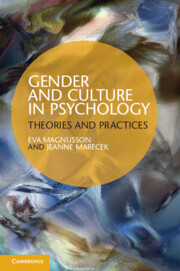Book contents
- Frontmatter
- Contents
- Preface
- 1 Gender and culture in psychology: a prologue
- 2 Categories and social categorization
- 3 Laying the foundation
- 4 Theories of gender in psychology: an overview
- 5 A turn to interpretation
- 6 Doing interpretative psychological research
- 7 Discursive approaches to studying gender and culture
- 8 Gender and culture in children's identity development
- 9 Identity and inequality in heterosexual couples
- 10 Coercion, violence, and consent in heterosexual encounters
- 11 Women's eating problems and the cultural meanings of body size
- 12 Psychological suffering in social and cultural context
- 13 Feminism and gender in psychotherapy
- 14 Comparing women and men: a retrospective on sex-difference research
- 15 Psychology's place in society, and society's place in psychology
- References
- Index
5 - A turn to interpretation
Published online by Cambridge University Press: 05 June 2012
- Frontmatter
- Contents
- Preface
- 1 Gender and culture in psychology: a prologue
- 2 Categories and social categorization
- 3 Laying the foundation
- 4 Theories of gender in psychology: an overview
- 5 A turn to interpretation
- 6 Doing interpretative psychological research
- 7 Discursive approaches to studying gender and culture
- 8 Gender and culture in children's identity development
- 9 Identity and inequality in heterosexual couples
- 10 Coercion, violence, and consent in heterosexual encounters
- 11 Women's eating problems and the cultural meanings of body size
- 12 Psychological suffering in social and cultural context
- 13 Feminism and gender in psychotherapy
- 14 Comparing women and men: a retrospective on sex-difference research
- 15 Psychology's place in society, and society's place in psychology
- References
- Index
Summary
In Chapter 3, we presented some conceptual bases shared by researchers who regard people as intentional, reflective, self-knowing, and culturally situated. These researchers have found the tools and practices of conventional academic psychology (such as experiments, quantitative scales, questionnaires, and statistical hypothesis testing) to be ill-suited for answering the questions they want to ask. In place of conventional tools and practices, these researchers use interpretative methods; that is, methods that take meaning as a central focus for psychological investigation. Often the expression “qualitative methods” is used to denote these approaches, but we prefer “interpretative methods,” an expression that points explicitly to the researcher's analytical work and to the view of humans as meaning-making.
The foundational assumption of interpretative approaches is that meaning-making is central to individuals, as well as to social life and culture. Interpretative approaches focus on individual meaning-making, as situated in cultural contexts. In other words, researchers attend to the meanings people give to the flow of events, activities, and relationships in their lives. Researchers attend as well to the ways that such meanings form the basis for action. Interpretative researchers also try to answer questions about where meanings come from and about how people make social meanings into their own or sometimes resist them.
- Type
- Chapter
- Information
- Gender and Culture in PsychologyTheories and Practices, pp. 44 - 51Publisher: Cambridge University PressPrint publication year: 2012



